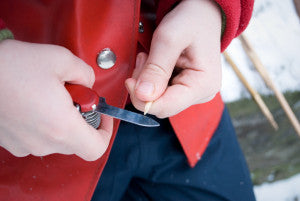By Beth Buck

If you haven't already read C.S. Lewis's
Prince Caspian or seen
either of the
two film adaptations, then you really should. Not only is it an excellent story and a beloved classic, it also has an emergency preparedness lesson to teach.
“What's that?” I hear you ask. “Emergency Preparedness
and Narnia in one package? How could such a thing be so?”
Very easily! Ever heard the phrase “everyday carry?” It refers to the practice of habitually carrying survival items in your pockets or in your purse. Should an emergency arise while you are at the grocery store, at the park with your kids, or visiting your grandmother, having these items on hand can get you out of a tight spot. You'd be prepared, even without your 72-hour kit.
I bring it up because this philosophy appears, albeit surreptitiously, in
Prince Caspian. In the very first chapter, our four protagonists (Peter, Susan, Edmund, and Lucy Pevensie) are sitting at a train station minding their own business. Suddenly they Replace themselves magicked onto an uninhabited forest island in the middle of nowhere. They have nothing, no extra clothing, shelter, or any supplies except for what they already have on hand, in their pockets. Fortunately, they have well-stocked pockets. Between the four of them, they have: Sandwiches, a compass, matches, pocketknives (2) and, for some reason, a flashlight. I don't know what kind of early 1940s young man regularly kept a flashlight in his pocket; probably the same kind of person who would carry a compass with him on a routine train journey.
And not only did Peter
just happen to have matches on him,
in his coat pockets, he also made a fire with them like it was no big deal. If you've ever made a fire, you know there is a method to it. You can't just stick a lit match on a pile of logs and expect it to become a decent campfire. Edmund and Peter also have skill in using a compass correctly and in skinning bears.
Lord Baden-Powell would be proud.
That is the most striking thing about Peter's everyday carry: the fact that C.S. Lewis hardly calls any attention to it at all. It's not considered strange or unusual for a boy to have a pocketknife and matches in his pockets. Same with the compass – it only gets a passing mention in chapter nine (“You’ve got that pocket compass of yours, Peter, haven’t you? Well, then, we’re as right as rain.”), and it is assumed that he would know how to use it correctly.

Obviously we live in very different times. A modern boy of the same age as Peter would be suspended if he'd brought a pocketknife to school. That's no reason to dismiss the utility of everyday carry, however. We should bring this back into fashion! Modern everyday carry aficionados suggest the following supplies:
Those are just suggestions to start with, of course. I know a woman whose everyday carry items add an additional seven pounds to the weight of her purse, and she is adamant about removing none of it.
Sadly, I must point out that of the four Pevensie children, only the boys found useful items in their pockets. I can only presume that this is because a) scouting was not widely encouraged for girls during that time period, or b) Susan's and Lucy's pockets were not big enough to fit anything useful in them. The pockets on modern women's jeans are notoriously small, so it seems as though not much has changed in that respect since
Prince Caspian's original publication date.
Whether you deem yourself at risk for magical transportation into the middle of nowhere, or only those little everyday sorts of emergencies, everyday carry items are sure to come in handy.
 Beth Buck has been involved with emergency preparedness since her very earliest years. She enjoys hiking, martial arts, reading, and writing about food storage. Beth lives in the Intermountain West with her family.
Beth Buck has been involved with emergency preparedness since her very earliest years. She enjoys hiking, martial arts, reading, and writing about food storage. Beth lives in the Intermountain West with her family.

 If you haven't already read C.S. Lewis's Prince Caspian or seen either of the two film adaptations, then you really should. Not only is it an excellent story and a beloved classic, it also has an emergency preparedness lesson to teach.
“What's that?” I hear you ask. “Emergency Preparedness and Narnia in one package? How could such a thing be so?”
Very easily! Ever heard the phrase “everyday carry?” It refers to the practice of habitually carrying survival items in your pockets or in your purse. Should an emergency arise while you are at the grocery store, at the park with your kids, or visiting your grandmother, having these items on hand can get you out of a tight spot. You'd be prepared, even without your 72-hour kit.
I bring it up because this philosophy appears, albeit surreptitiously, in Prince Caspian. In the very first chapter, our four protagonists (Peter, Susan, Edmund, and Lucy Pevensie) are sitting at a train station minding their own business. Suddenly they Replace themselves magicked onto an uninhabited forest island in the middle of nowhere. They have nothing, no extra clothing, shelter, or any supplies except for what they already have on hand, in their pockets. Fortunately, they have well-stocked pockets. Between the four of them, they have: Sandwiches, a compass, matches, pocketknives (2) and, for some reason, a flashlight. I don't know what kind of early 1940s young man regularly kept a flashlight in his pocket; probably the same kind of person who would carry a compass with him on a routine train journey.
And not only did Peter just happen to have matches on him, in his coat pockets, he also made a fire with them like it was no big deal. If you've ever made a fire, you know there is a method to it. You can't just stick a lit match on a pile of logs and expect it to become a decent campfire. Edmund and Peter also have skill in using a compass correctly and in skinning bears. Lord Baden-Powell would be proud.
That is the most striking thing about Peter's everyday carry: the fact that C.S. Lewis hardly calls any attention to it at all. It's not considered strange or unusual for a boy to have a pocketknife and matches in his pockets. Same with the compass – it only gets a passing mention in chapter nine (“You’ve got that pocket compass of yours, Peter, haven’t you? Well, then, we’re as right as rain.”), and it is assumed that he would know how to use it correctly.
If you haven't already read C.S. Lewis's Prince Caspian or seen either of the two film adaptations, then you really should. Not only is it an excellent story and a beloved classic, it also has an emergency preparedness lesson to teach.
“What's that?” I hear you ask. “Emergency Preparedness and Narnia in one package? How could such a thing be so?”
Very easily! Ever heard the phrase “everyday carry?” It refers to the practice of habitually carrying survival items in your pockets or in your purse. Should an emergency arise while you are at the grocery store, at the park with your kids, or visiting your grandmother, having these items on hand can get you out of a tight spot. You'd be prepared, even without your 72-hour kit.
I bring it up because this philosophy appears, albeit surreptitiously, in Prince Caspian. In the very first chapter, our four protagonists (Peter, Susan, Edmund, and Lucy Pevensie) are sitting at a train station minding their own business. Suddenly they Replace themselves magicked onto an uninhabited forest island in the middle of nowhere. They have nothing, no extra clothing, shelter, or any supplies except for what they already have on hand, in their pockets. Fortunately, they have well-stocked pockets. Between the four of them, they have: Sandwiches, a compass, matches, pocketknives (2) and, for some reason, a flashlight. I don't know what kind of early 1940s young man regularly kept a flashlight in his pocket; probably the same kind of person who would carry a compass with him on a routine train journey.
And not only did Peter just happen to have matches on him, in his coat pockets, he also made a fire with them like it was no big deal. If you've ever made a fire, you know there is a method to it. You can't just stick a lit match on a pile of logs and expect it to become a decent campfire. Edmund and Peter also have skill in using a compass correctly and in skinning bears. Lord Baden-Powell would be proud.
That is the most striking thing about Peter's everyday carry: the fact that C.S. Lewis hardly calls any attention to it at all. It's not considered strange or unusual for a boy to have a pocketknife and matches in his pockets. Same with the compass – it only gets a passing mention in chapter nine (“You’ve got that pocket compass of yours, Peter, haven’t you? Well, then, we’re as right as rain.”), and it is assumed that he would know how to use it correctly.
 Obviously we live in very different times. A modern boy of the same age as Peter would be suspended if he'd brought a pocketknife to school. That's no reason to dismiss the utility of everyday carry, however. We should bring this back into fashion! Modern everyday carry aficionados suggest the following supplies:
Obviously we live in very different times. A modern boy of the same age as Peter would be suspended if he'd brought a pocketknife to school. That's no reason to dismiss the utility of everyday carry, however. We should bring this back into fashion! Modern everyday carry aficionados suggest the following supplies:
 Beth Buck has been involved with emergency preparedness since her very earliest years. She enjoys hiking, martial arts, reading, and writing about food storage. Beth lives in the Intermountain West with her family.
Beth Buck has been involved with emergency preparedness since her very earliest years. She enjoys hiking, martial arts, reading, and writing about food storage. Beth lives in the Intermountain West with her family.


